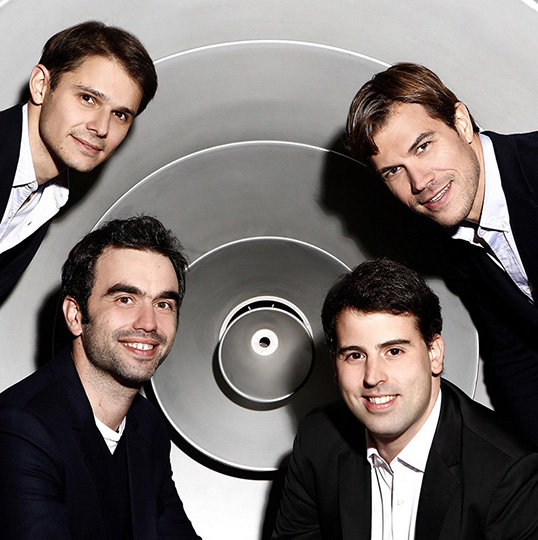Modigliani Quartet, Bidini bring finely honed expression to Brahms and Mozart

The Modigliani Quartet performed Thursday night for the Chamber Music Society of Salt Lake City. Photo: Marie Staggat
Celebrating its 15th anniversary, the Modigliani Quartet has without question made its mark on the world’s chamber music scene. Right now the ensemble remains at the top of its game and continues to be a group to be reckoned with.
The Modigliani made a return visit to Libby Gardner Concert Hall Thursday, an event presented by the Chamber Music Society of Salt Lake City, and they wowed the sizable audience in the hall with their artistry and interpretative acumen.
The Modigliani foursome (violinists Amaury Coeytaux and Loïc Rio, violist Laurent Marfaing, and cellist François Kieffer) opened with Mozart’s Quartet No. 19, K.465, In this “Dissonance” quartet, Mozart brought a level of sophistication to his quartet writing that fell outside of the norms for the genre and which wasn’t fully understood in his lifetime. Today, the intricacies of the writing and the inventiveness of the harmonic language aren’t so odd or unusual, but in their interpretation, the quartet underscored the creativity of the work with their elegant and refined playing.
They brought finely honed expressiveness and lyrical beauty to their reading, especially in the slow movement, which, in their hands, became a romantically tinged, introspective aria. This was definitely the high point of this piece, and one of the highlights of the evening.
Brahms was notoriously self critical, and it was only after years of writing string quartets only to destroy them, that he finally allowed a pair to be published, the two that make up his Op. 51.
The first in this pair, the Quartet in C minor, is one of the finest in the string quartet literature. Brahms pours his soul into it, creating the fiery passion his music is known for in the opening and closing movements, which the Modigliani played with ebullient energy and power. Their account of these two movements was filled with vibrant strokes and an intensity of expression that did full justice to the music.
The lovely second movement Romanze is imbued with a touch of introspection that the players captured wonderfully in their interpretation. They played with an almost Mozartean delicacy and a sensitivity to the movement’s soft mood that underscored the heartfelt expressiveness Brahms so deftly creates.
The third is a bit heavier and darker than the preceding movement. The four brought depth and finely crafted phrases to their reading that emphasized the mellowness of the music.
To close out the concert, Fabio Bidini joined the Modigliani members for a powerful account of Brahms’ Piano Quintet in F minor, Op. 34.
Bidini, who also enjoys a busy solo career, is an outstanding chamber musician. His playing blended remarkably well with the strings and he never overpowered them, even in the most passionate passages. Their collaboration was well balanced and solid throughout.
In the opening movement, Bidini and his colleagues played with a lightness that allowed the inner voices to be distinct, even in the more densely textured passages. The same held true for the Scherzo and Finale. All five musicians brought out the dramatic vibrancy of the Scherzo with their bold playing, and they captured the shifting moods of the last movement convincingly. They paid close attention to details of dynamics, tempi and expressions as they swung between the robustness of the main theme and the softer contrasting sections, which they played with subdued lyricism.
As an encore, the players gave a captivating reading of the airy and lighthearted Scherzo from Dvorak’s Piano Quintet in A major, op. 81.
The Chamber Music Society of Salt Lake City’s next concert takes place 7:30 p.m. February 5, 2019, at Libby Gardner Concert Hall. The program features the Calefax Reed Quintet performing works by Janacek, Franck, Abing, Shostakovich and Bach. cmsoflc.org.